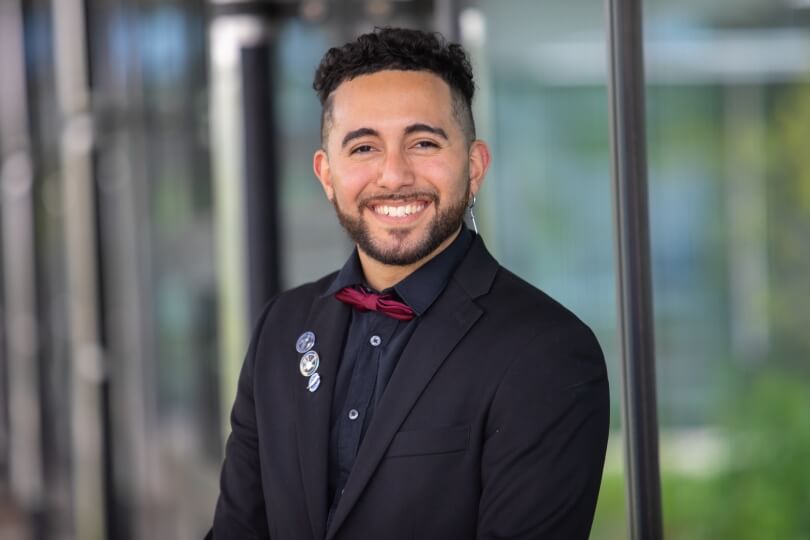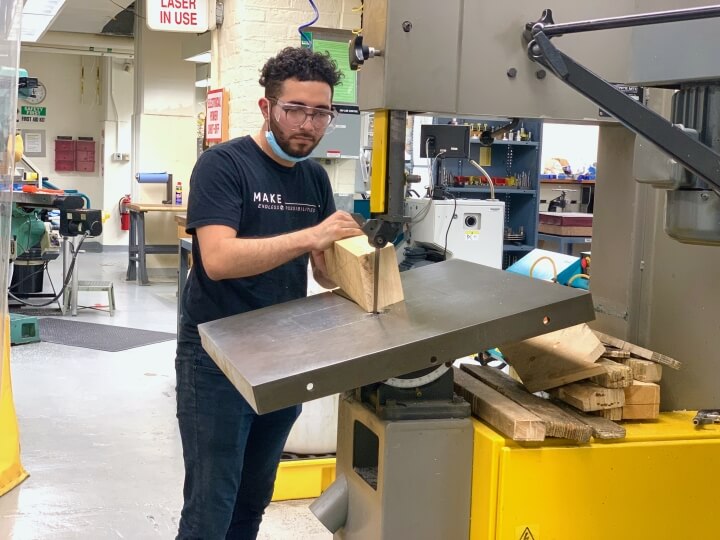David Andrade, S.B. '23 in mechanical engineering. (Eliza Grinnell/SEAS)
YouTube videos made David Andrade fall in love with space. Over and over again, he’d watch clips about the sun, distant stars, the reach of human communication, even the eventual heat death of the universe.
“It wasn’t just about the science,” Andrade said. “It was about the story behind it, the philosophy, and what it means. That mattered a lot more to me than just learning the information.”
Andrade, S.B. '23, didn’t arrive at Harvard planning to major in mechanical engineering, but through his coursework he discovered it was the best way to pursue his passion for aerospace technology. That passion has now led him to so many accomplishments: interning at companies like SpaceX and Blue Origin; designing the orbits of cube satellites with the Stubbs Astrophysics Group; serving as chief engineer for the Harvard Satellite Team, a sub-group under the Students for the Exploration and Development of Space (SEDS); and working on the multi-year, multi-student NASA Jet Propulsion Lab (JPL) senior capstone project. His contributions to the JPL project, which will be incorporated into NASA’s upcoming mission to explore Jupiter’s moon, Europa, was recently selected for a Dean’s Award for Outstanding Engineering Projects.
“There are more stakeholders that really care about this thing being tested and designed in such a way to actually be space-ready,” Andrade said. “People are very involved, which is what I think the engineering process should be more about.”
Though he planned to study biochemistry upon arrival at Harvard, as a freshman Andrade began taking introductory mechanical engineering classes at the Harvard John A. Paulson School of Engineering and Applied Sciences (SEAS). He was very much a novice in engineering when he started out, but by his sophomore year had grasped enough of the material to begin taking graduate level courses. He credits that rapid growth to his professors, who were always encouraging and willing to meet with him outside of the classroom to answer questions.
“I’d go to office hours, and a professor would egg me on to ask more and more questions,” Andrade said. “Being able to have that encouragement from faculty, that extra help, I’ve held onto that philosophy throughout my four years. If I ask for something, the worst case is that they say no, and the best case is I’ll be able to pursue what I want to pursue. Eventually, I started to understand how engineering works on a fundamental level, which allowed me to pursue the things I really wanted to pursue, such as aerospace engineering.”
Even before switching from biochemistry to mechanical engineering, Andrade was already diving into his work at SEDS. He joined in his first semester, and over the years took on more and more responsibilities until being named chief engineer with the Harvard Satellite Team. SEDS is currently building a cube satellite that was recently selected for launch into low orbit through the NASA CubeSat Launch Initiative.
“One of things we worked really hard on is establishing why people should care, what our group’s north star is, and what we’re trying to accomplish,” Andrade said. “For us, it’s building this sun-tracking solar panel satellite by Fall 2024, and getting it launched by NASA.”
Andrade’s approach to leadership at SEDS goes all the way back to his youth watching space videos on YouTube. He’s always tried to explain the bigger picture and value of SEDS short-term projects, how they all fit together into a larger mission that’s worth pursuing.
“Without that north star, you don’t have a really good sense of why you’re doing what you’re doing, and you won’t want to go to the SEC at 9 p.m. and hook up two wires to see if they crimp down,” he said. “A lot of projects at SEDS boil down to how they connect to our larger mission, and what valuable skills you can learn while doing them. You need to have a story, or else the institution fails.”
Andrade has accomplished all this as a first-generation, low-income (FGLI) student. The son of Honduran immigrants, Andrade grew up in Miami, where he had to navigate much of the college application and admissions process on his own.
David Andrade uses a band saw during a Japanese wooden boatbuilding workshop. (Matt Goisman/SEAS)
“I told my mom I’d applied to 14 colleges and she knew one of them,” he said. “I couldn’t ask some kinds of questions to my parents, because they didn’t have that experience growing up. They didn’t have the educational opportunities that are afforded to me now. I didn’t have the aspirations to attend this university until my teachers told me I could, because I didn’t have any models before them.”
Aerospace will always be Andrade’s first love, but he’s never wanted to be just one thing. Throughout his time at Harvard, he’s also been an overnight supervisor at the Harvard Square Homeless Shelter, an advocate for Harvard Undergraduates for Bipartisan Solutions, a deputy director for the Open Online Education Project, and even a member of the undergraduate boxing club. This past winter, he helped build a 22-foot-long Japanese wooden boat in a workshop offered by Harvard’s Edwin O. Reischauer Institute of Japanese Studies.
He plans to continue that well-rounded development after graduation, starting with a trip to Kenya to study climate change and wildlife conservation. After that, he may return to the aerospace industry or he may pursue other career paths, such as working in labs that produce low-cost medical equipment for under-resourced regions of the world.
“There’s an opportunity to go explore things that you might not get later in your life,” he said. “I want to make sure I take advantage of all the opportunities available to me.”
Press Contact
Matt Goisman | mgoisman@g.harvard.edu

